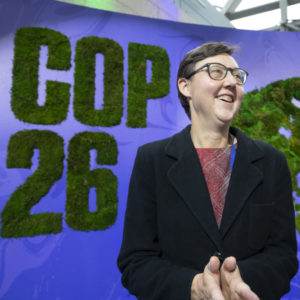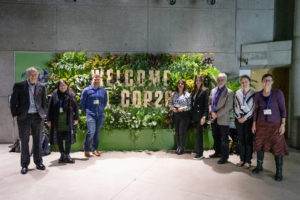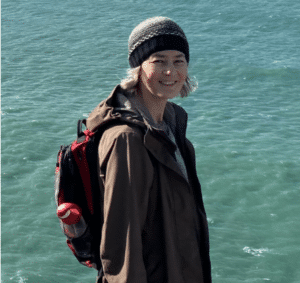The UN Climate Change Conference of the Parties (COP) is a global summit on climate change. ‘Parties’ is used as a descriptor for countries. In 2022 it was the 27th time that countries came together to discuss every aspect of climate change, which is why it is called COP27.
For information about COP28, which happened in Dubai over November & December 2023, please see here.

What was COP27?
The world’s most significant summit on climate change is the UN Climate Change Conference of the Parties, otherwise known as COP.
This conference is attended by representatives of the countries that have ratified the United Nations Framework Convention on Climate Change (UNFCCC) – a treaty agreed in 1994.
COP takes place each year unless the Parties to the Convention agree otherwise. 2022 saw the 27th occurrence of the conference, which is why it’s referred to as COP27.
The COP comes together to review the implementation of the UNFCCC, which has the ultimate goal of limiting human impact on our climate system. One key task is to monitor each country’s progress towards their individual targets, known as Nationally Determined Contributions.
When and where was COP27?
COP27 took place in the coastal town of Sharm al-Sheikh, on the Sinai Peninsula in Egypt, from 6th – 18th November, 2022.
The location of COP28 in 2023 was in the UAE, from 6th – 17th November, 2023, and COP29 will be held in Baku, Azerbaijan in November 2024.
Why Egypt?
Officially, the COP takes place in Bonn, Germany, unless a member country offers to host the event instead. This means that in practice, it tends to move regularly around the different global regions recognised by the UN.
There are those who hoped that hosting COP27 in Egypt would give a more powerful voice to all African countries, who are among those most affected by climate change. One reported criticism of Glasgow’s COP26 was that it was too weighted towards more developed countries and the actions they could take to limit their emissions.
Egypt planned on COP27 being a “real African conference” with President Abdel Fattah el-Sisi saying in a speech at the COP26 in Glasgow 2021 that they will host COP27, “on behalf of African nations”.
Egypt’s Minister of Environment, Yasmine Fouad, thanked the UK for its efforts and initiative in COP26, promising to continue the hard work and to build bridges of cooperation, remove differences and find common ground.
“Egypt takes it upon itself to make every effort to achieve success in COP27 in facing this challenge that threatens the whole world, and will spare no effort to make COP27 hospitable and constructive for all,” she said.
Fouad added that COP27 would help African countries and the most affected nations to swiftly begin their measures to confront climate change and adapt to its impact.
Nationally Determined Contributions
Every country attending COP will determine, plan and regularly report on their climate change adaptations through their Nationally Determined Contributions (NDCs).
NDCs are non-binding plans made by countries around the world, which outline their work towards targets for emission reductions and other measures that were set out in the Paris Agreement.
The goals laid out in each country’s NDC include a commitment to working towards being climate neutral by 2050, limiting global warming to well below 2 degrees celsius and increasing efforts to limit it to 1.5 degrees, as well as reductions in emissions of greenhouse gases.
Individual countries decided their own contributions to the aims of the Paris Agreement, though Article 3 requires NDCs to be “ambitious efforts” towards “achieving the purpose of this Agreement” and to “represent a progression over time”.
Nations were expected to update and report on their NDCs before COP27.
What was Practical Action’s role?
 Practical Action was an official observer at COP26 for the 6th consecutive year. Before the Glasgow conference, our Head of Climate and Resilience, Colin McQuistan, said:
Practical Action was an official observer at COP26 for the 6th consecutive year. Before the Glasgow conference, our Head of Climate and Resilience, Colin McQuistan, said:
“Having official observer status is incredibly important as it gives us access to represent the people who face the most devastating effects of climate change. The talks will shape the world’s response to what is still our biggest challenge. They provide a unique opportunity for the smallest and least developed countries, to sit as equals at the negotiating table with the likes of the United States, Russia and China”.
Our role at the COP26 conference was to amplify the voices of the people we work with, and to share what we have learned from those who are already adapting to extreme climate events. Some of our staff were part of national delegations, directly influencing the negotiations. Others made sure that a range of people with influence on the COP outcomes were hearing from the most vulnerable and focused on ensuring more support and finance is directed to meeting their needs.
Through the two weeks we provided evidence and technical support to governmental delegations, participated at events and spoke to the media. We showcased bottom-up adaptive work by people on the front line of climate change, which works with nature, not against it. We called for a new focus on the approaches and resources needed to scale change and enable communities to adapt and deal with the loss and damage that they are already experiencing.
Practical Action’s CEO, Sarah Roberts summed up her reaction to the outcome of COP26 by saying;
“In the run up to the COP the latest science declared a code red for humanity but the outcomes of COP fell way below what is required to move us onto a path that limits global warming to 1.5 degrees, critical for a viable future.
Even if 100 per cent of the commitments made at Glasgow are met, we are still on a trajectory for at least 2.4 degree warming, which would be catastrophic… Outcomes from COP 26 were nowhere near good enough but it feels like we have reaching a positive tipping point, in terms of public support and increased momentum for the type of systemic change that is essential.”
The UK retains the COP presidency until COP27 begins and Practical Action worked with various coalitions to push the UK leadership team to really use their influence and mandate to enable COP27 to deliver much more.
Practical Action’s decades of experience in helping people on the front line of climate change to adapt sustainably to the new challenges they face has never been more relevant, nor more necessary. Our aim is to ensure developing nations, who are disproportionally impacted by climate change, will not be left behind and we will bring a diversity of views and expertise from our work with communities across South Asia, Latin America and Africa.
COP27 and beyond
The momentum that gathered speed during COP26 and the increasing prevalence of environmental stories in the media, coupled with the ever increasing signs across the world of the climate crisis, have come together to keep the COP process in the public eye.
The way in which the world responds to the climate emergency is crucial to all our futures and we know that those living on the front line are now facing an emergency of unprecedented proportions. We will continue to work with many others to support, demonstrate and scale the solutions required for positive futures for the people on the front line of climate change and get finance redirected to climate solutions that deliver for people and nature.
There’s a great deal of work to be done, but we know from experience that big change is possible and we invite you to join us as we chose a better future. Now.
